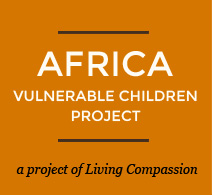For nearly everyone in Zambia, Sunday is a day for church and family. The shops are closed and the streets are deserted until early afternoon. We generally look forward to the quiet to get caught up on email, to hand-wash some clothes, and to rest a little, and this morning was no exception. Later, as soon as things began rolling again in Ndola, we headed out to Kantolomba to meet with the ladies there.
We had just one large task we hoped to accomplish in the afternoon. We wished to video the women telling the stories of their lives in Kantolomba before they were “adopted” by Living Compassion (this is the way they describe it to themselves), and the change that has happened since becoming involved. We are hoping that this footage will give those in America a chance to experience the people here in a way that is not possible through still photographs. We set up the camera on the porch of our nearly finished medical and classroom building, and, with Theresa translating, interviewed the women one by one.
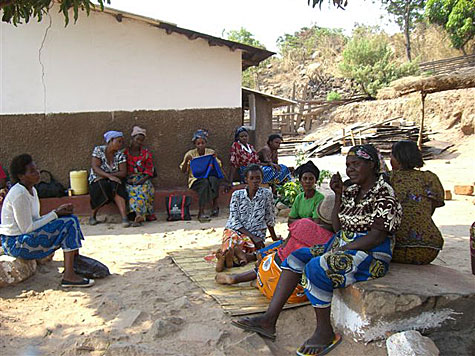
Waiting to begin
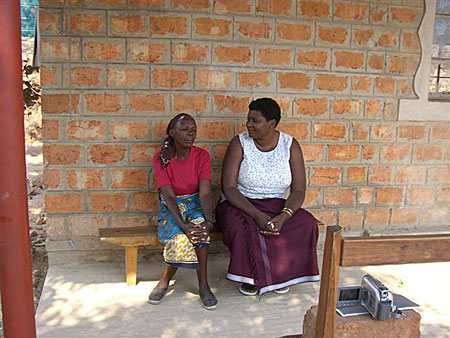
Theresa and “the old lady,” Margaret
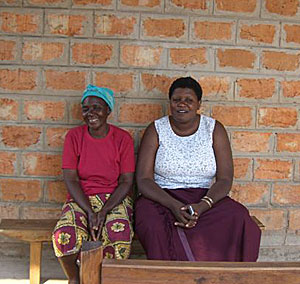
Theresa and Angela
It was wonderfully moving to watch these women speak from their hearts and to hear their gratitude. Here are some of the things they said:
Veronica told us that when she was a girl she had been forced to quit school when she became pregnant with her first child. Now, with the help of the project, she was going back to school and hoped to finish grade 12 next year.
Beatrice told us that before she was employed her family did not often manage to eat more than once a day, and sometimes not even then. Now they can afford to eat three times a day. “It is a miracle for us!” she said. “It seems like it has come from God that you are helping us.”
Georgina has six children. Not long ago she was selling charcoal beside the road to try to make enough money to feed them. Now her children are going to school. She can even buy them clothes, she said.
Margaret, the one they call “the old lady,” said that she never thought she would make a salary in her old age. She used to sleep on the floor and did not even have a blanket. Now she has a mattress, she said, and can give food to her children and grandchildren.
Agnes, one of our new employees, told us about the difference in her life after only one month working for Living compassion. The first time she was paid she went to the market and bought a whole bag of mealy-meal—the first time she has ever possessed so much food at one time. She is looking forward to getting “fat” she said (to tell someone they are fat, here in Zambia, is considered a great compliment—it means you are healthy) and to becoming a part of the team.
More powerful even than the particulars of these women’s stories was the glimpse their narrations gave us into the extreme poverty they and all those who live in Kantolomba have labored under for so long. Truly, it is a wonder that anyone has survived. Many have not, of course; those that have, like these women, all have found some hard way to scrape together enough money to keep starvation at bay. They may have brewed the illicit liquor that the compound is known for, gathered firewood from the bush, sold something beside the road, or just begged from their neighbors, but all of them have refused to give up. It was remarkable how many said, as their first statement after their age and name, that they were widows. Imagine what it must have been like for them, without help, while caring for six, seven, eight children, to struggle each day for the small bag of nchima that would keep them all alive. Imagine also how it must have felt for them to be seen by someone who cares and to have been given the means to end their hunger.
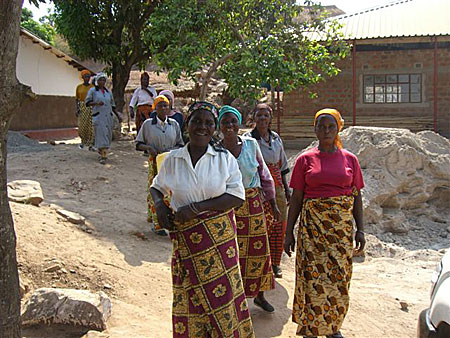
Violet, Christina, Angela, and others
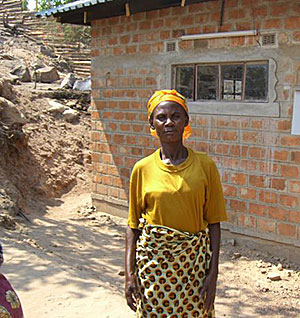
Foster
After the taping was finished Beatrice shyly presented us with a letter, written in the most beautiful cursive by her husband, Duncan, who is a teacher at one of the local schools (Beatrice has no English). This letter perfectly captures the gratitude of the people here and the beauty of the work we are doing. Representing both himself and his wife, Duncan wrote:
Dear Living Compassion around the world,
Greetings from Ndola, Zambia. It is with much gratitude of heart as a family to thank you a lot for the excellent work you have performed towards us in the family of seven. For providing to us the most needed needs that every family on our Zambian soil is struggling to achieve in the world of today.
Your coming to our community attaches great importance towards us. You come to restore our human dignity. Mankind without a shelter and food is none respected at all. That is how we were before you came to us. We were a lost people. But now history is changing in Kantolomba community.
In respect of you we would say that you are unbeatable where your true love, your true compassion, and your co-operation are concerned. Many of us have been rescued from the pit of shame and rejection. Our poor house structures have been well rehabilitated, plastered, and well roofed in our community. All these have been done alone by the Living Compassion project. We could not afford all these things on our own efforts.
Your project has purged away the ignorance that did exist for some, especially some of the brothers and sisters who lived in isolation, because of the traditional values and religions. Today we have been united as one without any hindrances of culture, tribe, and religious background. This has come because of Living Compassion. We have one tribe of love that works together to bring up one thing, that is development of our community. We are changing for the better every day. Even our small children are able to learn to write and read.
May you continue with the work you have started. You shall return one day to see the children you are supporting today reach the heights of prominence and also help others who are living in the vulnerable societies. All these are done through the power and support of Living Compassion Team of America.
Yours faithfully,
Beatrice Kasenzi, and husband Duncan Muzala.
Gratitude was the theme of the day, and has been the theme of this whole trip, really: gratitude both to those in the States and elsewhere who so generously support the work in Kantolomba, and to each person in Kantolomba who works every day to turn that generosity into something that saves lives and returns dignity, as Duncan wrote, to the people.
Most of the women got up soon to pack the handbags they had made into a large duffle for the journey to America. Others of us went to inspect the work on the roof of our school building that had been going on in the background all this while. Sam, the carpenter in charge of this portion of the project, had volunteered to work on Sunday so that the job could be done before we left on Tuesday. He was there with his first-born son, installing the metal roofing sheets against the rains that will soon be coming to Zambia.
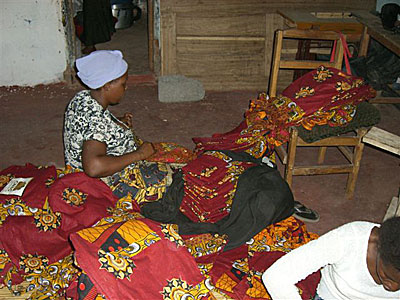
Georgina folding bags
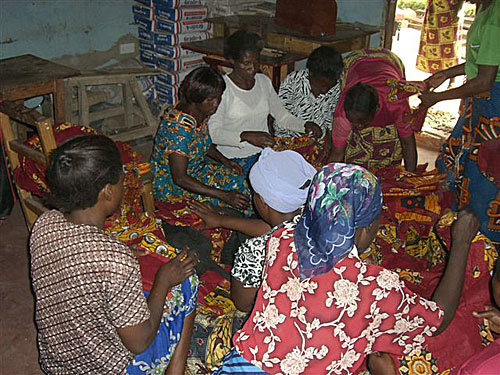
Packing
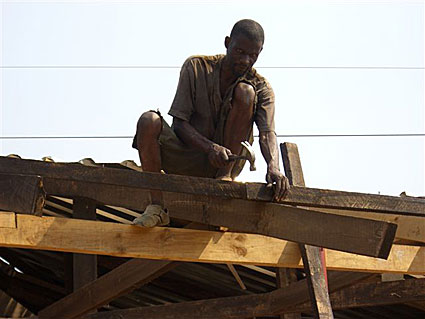
Sam
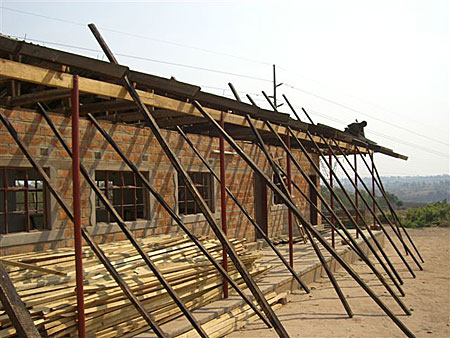
Much to do
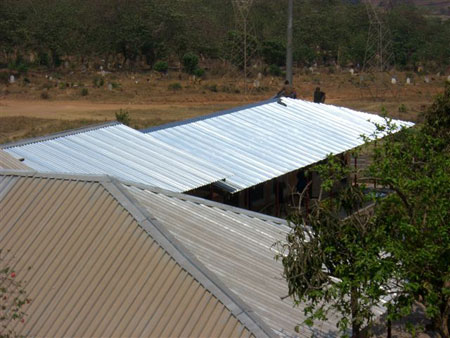
The nearly finished roof, with cemetery in the background
It was difficult to leave the compound as the day came to an end and the light began to soften towards evening. Many who have come with us to Zambia have remarked that, while life in Kantolomba is as different as could be from anything they had ever known, they felt as much at home there as anywhere else on earth. There is something special about being in Kantalomba. In America, of course, most people have plenty of food to eat. Most have clothes, and good houses, and every other material thing they might need. Often, however, we do not have the peace we are looking for. This peace is what we receive from the work we do in Africa. All the people involved, black and white, here and across the ocean, are working together for a common good. A sort of magic comes from this that cannot really be described, but can be felt by everyone who sets foot on the property. Together we are creating peace.
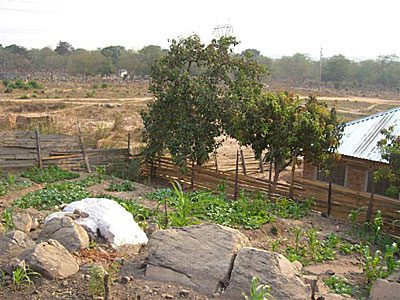
The garden
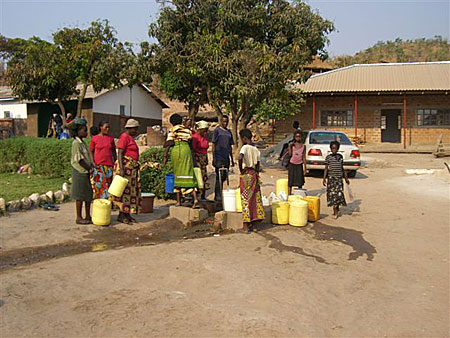
Collecting water before heading home
